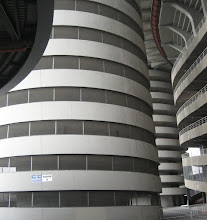The media are known to be hypercritical of performances, and definitely too quick to speculate as to which team will win a season or tournament based solely on a transfer or a singlular performance. However, as the income of journalists and their employers has relied more on clicks and views, the hyperbole with which they deliver their sporting opinions has reached more harmful levels. Words from pundits influence fans, who in turn abuse players and one another on social media and sometimes even in person. For some reason, though, the Italian media has become particularly dissonant, often producing critiques of players and teams that are completely out of touch with reality and actually the polar opposite of the rest of the footballing world. As if Serie A did not have enough problems, now they are being further harmed by the toxic Italian media.
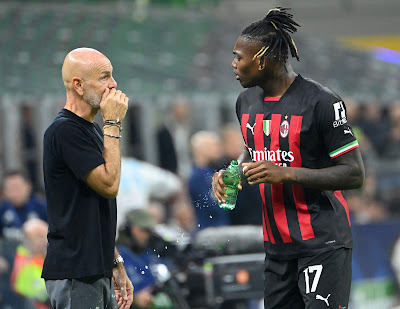 |
| Both victims of the toxic Italian media. |
When did this trend begin? There is an argument to be made for this element having always been there. Certainly, there have always been particular pundits who are more vicious than others with their criticisms. Even the best, most level-headed people in the media say things they regret or are overly harsh at times. However, this recent trend is something I noticed more intensely since the return of football after the COVID lockdown. While we might think that losing so many lives, particularly in the Lombardy region, for example, would make people more humane and compassionate, the opposite seems to have occurred.
 |
| This team gave Milan fans a reason to believe again... but apparently no one else does. |
My suspicions started to rise when Milan's amazing form coming out of lockdown was largely overlooked or dismissed. I was biased, I thought, it was just my imagination. But as the years went by and Milan continued to stay consistently in the top three to four for most of the past three years despite having the youngest team with the lowest wagebill of those top teams, the media's reporting on the team's performances did not at all match what was happening on the pitch. It was not only Milan who were being maligned, but obviously, as someone who focuses primarily on Milan, I watched every match and had the data to know that the comments with this team did not correlate with the performances.
That first full season after COVID, the 2020-21 season, Inter won the Scudetto, and were also the media darlings, despite crashing out of the Champions League in the group stage for the third year running and cruising through the second half of the season. They also had a wagebill that was 40% higher than Milan's, a team with an average age that was four years older, and a coach that was paid six times as much as Pioli. But Milan were nothing, according to the Italian media, despite staying in second place to a team like that. It was so ridiculous, I actually compared the two managers and teams in writing to demonstrate that Pioli had actually done so much more than Conte had done, despite having so much less. Pioli was even overlooked for many of the coaching awards he should have won throughout the season, let alone at the end of the season, although he was turning water into wine, while Conte was just pouring the wine he was given.
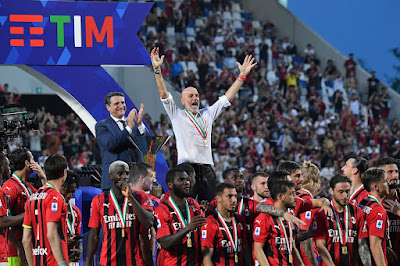 |
| Not just a surprise Scudetto, it was a miracle, but still Pioli and Milan are not respected. |
The next year, the year we actually won the Scudetto was so much worse. Milan were dismissed, match after match, win after win. Inter were only ahead of us eight out of the 38 weeks, but everyone was certain they were going to win the season. They never received a single red card, had so many favorable referee calls, yet no one in the media ever talked about that. They just piled on Milan hate and complete disrespect for Pioli and his injury-ravaged team. Then, when Milan won the "surprise" Scudetto, they seemed shocked and underwhelmed, many of the pundits still talking about Inter's season instead of giving credit to Milan. Bizarre, right?
Last year was Napoli's year, there is no question about that. However, I found it strange that the media spoke very little about how poorly their fans behaved in contrast to their performances. Literal warfare in the streets, racial abuse of opposition players, pouring urine on our fans, being abusive to opposition players and other fans online, threatening their owner, and so much more, or even the consequences of a traveling ban for fans during their Scudetto season. But no, Napoli and Spalletti were still the darlings of the media.
 |
| Spalletti finally got his first trophy, at Napoli of all places, but then left them to crash and burn. |
Milan, on the other hand, even at the beginning of the season, were immediately condemned as not being able to defend their Scudetto with even one poor performance. No one ever spoke of the injuries, the World Cup break, the lack of reinforcements, the sale of the club or any of the other factors that impacted Milan's season. And near the end of the season, when Milan Ultras called the team over to give them an actual pep talk ahead of an important Champions League match, not only did the media blow it way out of proportion, the FIGC investigated the incident as if it were a high crime. (In contrast, Lazio Ultras recently called their team over to literally harshly criticize them, and it barely even made the news and the FIGC could not have cared less.)
That bias carried over into this season. Milan won their first three matches, and the media actually hyped the Derby as the most even Derby in years going into it, even though Milan had gutted their team this summer, and had so many new players who had never even played in a Derby at San Siro before. So when Milan lost 5-1, the media did not hold back. (Was it just because they were embarrassed for being so wrong?) They tied that loss to the other four losses to Inter this calendar year, in spite of Milan having an entirely different squad to play with (And also the two teams never having played each other so many times in such a short period before.)
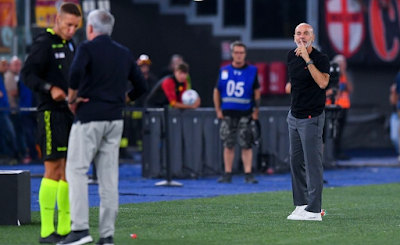 |
| Pioli outclassed and outcoached the great Mourinho, many times, but no one talks about that. |
So, when Milan, playing with new tactics and with a number of new players, lost this match, they condemned Pioli and the team as if it was all the same as last season. In fact, they went so far as to claim that the new players were "victims" of Milan having lost the previous Derbies this year. Pioli especially was criticized very harshly, with them claiming that he had not learned anything by going against Inzaghi five times within seven months, that he had never changed tactics.
They especially condemned his choices in defense without acknowledging he had no other choices due to injuries and suspension. These are the same people who widely criticized him for all of his tactical changes each time Milan played last season. And the same people who covered the transfer market ad nauseum which saw 17 Milan players leave the club, literally two-thirds of his squad. Apparently, they do not understand what change is.
 |
| None of the players in this pic are still at the club, but Pioli and Milan are still finding ways to win. |
Speaking of change, a week before the Derby, one pundit said this about Milan, "With the departure of Maldini and Massara, we thought Milan was in difficulty; instead, the club worked really well." Yet one week later, after a single loss, Milan "tactically committed suicide" and Pioli's reading of the match was "a disturbing sporting moment." No one had Milan winning anything this season. After the Derby, they all thought our season was over. Yet now, just three weeks later, Milan are top of the league. Despite being the only team to play five of their opening eight league matches away. The Italian media's narrative not only changes faster than a bad ref call, it just does not match Milan's actual performances.
When Milan drew with Newcastle just a few short days after the Derby, much of the Italian media continued their overly harsh criticism. While Milan had taken 25 shots and simply not been able to convert, clearly, according to the Italian media, they had not made enough effort. Some journalists did start to ease up on Pioli, while a few still blamed him.
 |
| First, they took away his entire support system, then they took 2/3 of his team. And he's still winning? |
Pioli has never been given credit for what he has done with this team, and against the odds that he has accomplished all of it with. He has seen two owners, two CEOs, two technical directors, and multiple sporting directors during his four year tenure. In spite of all of the backroom drama and very tangible changes, he has raised many young players as if he were a foster father, holding this team together by belief alone through experiences like the soul-killing loss to Atalanta, the COVID shutdown, the Europa League qualifying match with Rio Ave, qualifying for Champions League for the first time in seven years, winning the Scudetto for the first time in 11 years, and taking the team to a Champions League semifinal for the first time in 16 years. Many coaches are lucky to experience one or two of those things with a single team, but Pioli has been here for the entire roller coaster ride, and he is still here.
Conte could not take the pressure. After two years at Inter, he took his Scudetto, dedicated it to himself, and walked away with his hair plugs and ginormous paychecks, leaving Inter in financial ruin. Spalletti could not handle it. He walked away after two years and his first Scudetto, too. Yet both were (and still are) heralded as geniuses in the Italian media, despite having both walked into established teams with large wage bills before eventually winning. Pioli came into a fledgling project, won his Scudetto, and is still here, still fighting. Even now, although the club spent €134 million this summer, his team's wage bill is still smaller in comparison. And still, no one gives him half the credit of his peers who did so much less with so much more. Why is that, exactly? What will he have to do to earn their respect?
 |
| Why is he given respect? He cost Inter so much money, took his Scudetto, and ran. |
Or is respect even a thing they have to offer anymore? Beyond their criticism of Pioli, which surprisingly dissipated rather quickly once Milan continued winning in Serie A and are now top of the table, there is nothing like the toxic criticism the Italian media offered Rafael Leão this season. While he got off to his best Serie A start ever, the Italian media used him as a focal point of their vitriol after the Derby and especially after the innocuous draw vs. Newcastle. Bless him for taking it all in stride (or sometimes just calling it out) and not letting it affect his form, but it should not happen in the first place.
The Newcastle performance in particular stood out, because Leão was awarded Player of the Match by UEFA's Technical Observer Panel. While they stated that "He was a constant threat all game – quick, strong, showing good movement and proving a real danger in the box," the Italian media had quite the opposite view. La Gazzetta dello Sport and Il Corriere dello Sport actually named him the worst player on the pitch. Even a well-known Inter journalist noted the unwarranted criticism against Leão. Yet they continued to criticize him and hold him to higher expectations than other players.
 |
| It wasn't 90 minutes of this kind of dominance the Italian media were interested in, it was just one backheel. |
I mentioned in a recent preview that Leão's performances continuing to be such a lightning rod for the Italian media were not unique to him. Certain other very talented players in Italy have also received similar interest from the media. Players such as Mario Balotelli, Romelu Lukaku, and Victor Osimhen. Do you see the connection? It is one of the most accepted mainstream forms of racism in Italy, being overcritical of players who are black. Both the media and the FIGC took interest when Leão posted a video to his Instagram account recently of Milan players singing a song. Other players, other clubs, they could care less about what they do. We saw it with Kessié and Bakayoko, too, who, while wrong, were overly criticized and also punished harshly for something other players may not have even been punished for at all.
Another example, when Maignan was carded for a serious foul on Ekuban on Saturday, Genoa's president, Alberto Zangrillo accused his actions of being "murderous." A claim that the media quickly amplified, rather than buried. That is not how Italians ever describe bad fouls from other players who look like them. Even yesterday, after the Sporting Judges ruled that Maignan would only miss one match, as is the rule for a serious foul, a Neapolitan journalist condemned the ruling, insisting that there was unquestionable violent conduct and that he should have a longer ban. This, despite many goalkeepers coming out and claiming he should not have been carded at all. Why is this one foul so polarizing? Genoa's goalkeeper was sent off, too. But wait, his foul was on... Musah... oh.
 |
| Poor judgment or timing? Maybe. Premeditated or lethal? Maybe if you are racist. |
So is that why Milan are so criticized or easily dismissed? Because of the large number of players of color in our squad? Because of the lack of high profile players such as Dybala or Lautaro Martínez (...or who else is white?) in our squad? Or is it because they never believed in Pioli when he was hired, so still don't for some reason, despite extensive data and results demonstrating that they should? I do not understand why they are so toxic.
And it is not just toward Milan. Look at the recent issues with Osimhen at Napoli and their official TikTok account. Napoli never even apologized to him for openly mocking him and what can best case scenario be called racially insensitve videos, and the media was fine with this. The Nigerian Minister for Sport actually got involved before it was resolved. Everyone else was absolutely shocked that a club would do this to their own player, but Napoli fans and even most Italians will tell you there was never any problem with any of this, it was all acceptable behavior from the club. And the Italian media was right there spinning that narrative.
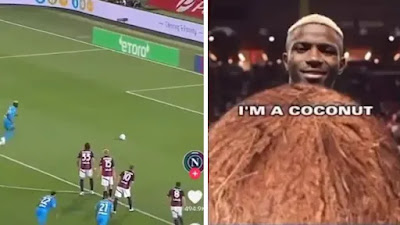 |
| To the rest of the world, this is disgusting behavior, to the Italian media, it's just a bigger paycheck. |
This summer, the Italian media showed exactly how toxic and fickle they could be. When Cardinale fired Maldini, an Italian and Milan legend, the media were rightfully shocked, initially. But even before the money started flowing for new players, they were quick to start reporting anything they could to undermine Maldini and Massara's legacy as directors. For some reason, they were fine embracing an American owner, because they viewed him as rich, someone who would bring prosperity to the area and the country, I guess. Someone they viewed as famous somehow or something.
So, even though Cardinale knew nothing about owning a football club, and even less about Milan's history, they were happy to destroy the image of a legendary player and technical director in order to brown-nose the rich guy. Because Hollywood made a movie about his plans in baseball. And when the rich guy's plan of gutting the entire team and bringing in new players was not working, did they blame him? No. Blame Maldini (although he was long gone.) Blame Pioli. Blame the black players. It is all very sickening, really. Even more so that fans believe their heaping load of crap that they shovel for clicks each day and join in on the toxic narrative.
 |
| Leão wearing the armband when Milan debuted their diversity and inclusion kits was perfect. |
As Maignan pointed out on social media this week after Zangrillo accused him of the absolute worst, "Words have meaning." Journalists and pundits should hold themselves to some standard of integrity where they take responsibility for their words, and the effects they have on the lives and livelihoods of players, teams, and others they discuss. But they don't. Even though they actually get paid for their words.
Even when their words impact the performances of players or teams, or result in further abuse from fans, or cross a line into discriminatory or hateful language or behaviors, there is seemingly no accountability or consequences for journalists. They don't even care that they make complete fools of themselves when their criticism is completely unwarranted or inaccurate. They just keep spewing their poisonous narratives, because the more vitriolic their words, the more clicks, the more money they make. There is no awareness of humanity, let alone some sense of responsibility in this toxic Italian media.
This post inspired by the music of Måneskin's "Gossip"
 Reviewed by Elaine
on
Rating:
Reviewed by Elaine
on
Rating:
